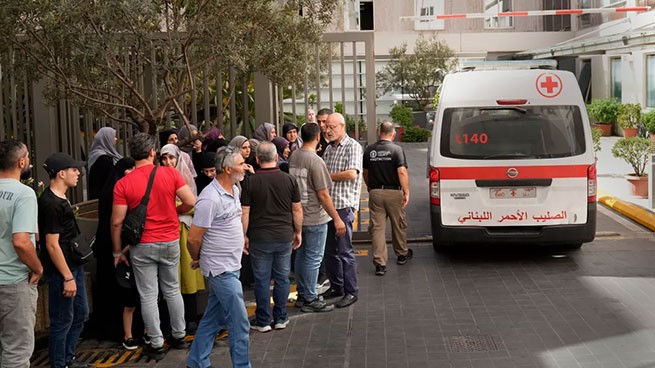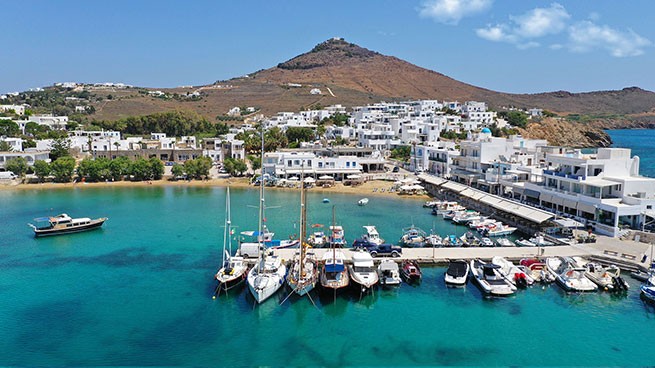Which islands have sold the most property over the past five years? Most people would probably answer that Santorini and Mykonos. But the reality is somewhat different and holds a few surprises.
More 12,000 properties that have changed hands since 2020 on Cycladesare located on Paros And TinoseA Santorini, Syros And Naxos round out the top five.
Considerable in relation to their size is also the number of sales that took place on some smaller islands, such as Antiparos and Koufonisi. The data obtained show the internal, often less obvious changes that took place in the Cyclades during this period, which have a direct impact on the preservation of their identity.

The data presented today, obtained from the Greek Land Registry. As the agency notes, the picture is not entirely accurate, since it not included sales data for areas where the mortgage offices were not fully absorbed by the final cadastral office (e.g. Amorgos and Kythnos). Also not included are sales data for the period during which only a mortgage office existed on the island before the cadastral registration began. Finally, Folegandros is not included because the cadastral registration began only recently. However, the data for the other islands is complete.
Classification
Overall, during the period under review (January 2020 – June 2024) the situation looks like this:
- In first place is Paroswhere committed 2172 purchase and sale transactions. Every year, more than 300 properties are sold on the island – more than 500 in 2021 and 2022. This year, by the end of June, 422 properties had changed hands, which indicates ongoing dynamics.
- In second place, very close, is Tinos With 2127 sales. This is an interesting development as the island has not been “in the spotlight” as a real estate asset. The most properties were sold in 2022 and 2023 (643 and 649 respectively).
- Santorini is in third place with 1873 sales. The number of legal transactions has been steadily increasing since 2022, as on most islands.
- Syros is in fourth place with 1508 transactionsAs with Tinos, these processes appear to be happening “silently,” which does not mean that changes on the island are unnoticeable.
- Naxos rounds out the top five with 1355 transactions with real estate, followed by Mykonos.
“The fate of any island is decided not by small owners and residents who elect virtually powerless mayors, but by investors.”
But the figures for the smaller islands are also very interesting. Among them, Antiparos stands out with 291 purchases (while Sikinos and Anafi, almost the same size, have 63 and 13 respectively). On Ano Koufonisi, despite being the smallest inhabited island of the Cyclades (its area is only 5.7 sq. km), in recent years 67 owners of real estate have changed. And also – always proportionally – Schinoussa with 46 purchases.
The landscape is changing

How do these events affect the Cyclades? What changes do they represent? The media asked three people who have been actively involved in the public debate about the future of the region in recent years. The interviewees were: Eleni Maistrou, Professor Emeritus of the NTUA School of Architecture and President of the ELLET Architectural Heritage Council, Yannis Spylanis, regional economist, professor at the University of the Aegean and Director of the Aegean Sustainable Tourism Observatory, and Anastasia Psalti, President of the Tinos Engineers Association and Secretary of the Tinos Municipality.
“It seems that investor interest has turned to Tinos and Syros due to the strong growth in property prices in Paros, Santorini and Mykonos,” Psaltis believes. – What worries me and concerns me is that investors have not come for what Tinos is, but to transform it into what they think will bring them income, without reference to the place. We already see this in the architecture and in the size, that is, in the scale of the buildings that have been built in recent years. Indeed, investors often buy large tracts of land with the expectation that they will use them for large-scale tourist investments, using one of the privileged urban frameworks that have been created for this purpose.
According to Mr. Spilanis, the growth in property sales in the Cyclades is due to various reasons. “The acceleration of the process of sale and transfer of land in the Cyclades, regardless of the island and its level of development, is mainly due to three reasons:
Firstly, the transformation of tourism into a real estate activity, due to the enormous growth of “mobile” capital seeking legalization, where profit must be obtained in the first stage of “investment” and not in the medium term, as in the case of hotel accommodation.
Secondly, in the desire of the local population to maintain a stable standard of living in the short term in the conditions of crisis and constant reduction of income both from their work and from small businesses. In addition, the conviction cultivated over the years that the land outside the settlement, i.e. the fields, is suitable for use, has made its contribution.
Thirdthe indifference, if not the contribution, of public policy, which sees the growth of the hotel industry (reports that many northern Europeans – and not only now – are “looking” for homes to spend the winter in Greece) and construction activity as “engines of growth”. The golden visa, the nomad visa and, above all, the spatial “policy”, instead of a medium-term strategy for the sustainable promotion of the islands' identity and the strengthening of their attractiveness as permanent residences through public investment, are the key instruments.”
“In Mykonos and Santorini, sales on the market are declining, which probably indicates saturation or excessive price growth. On the contrary, in Tinos, Syros and Naxos, as well as on some smaller islands such as the Small Cyclades, they are growing alarmingly, – notes Maistru. – First of all, it has become clear that the Cyclades have become a target for the real estate market. This means that land and housing are becoming a commodity with a market value, which is sold at a high price while demand is high, and then depreciates as soon as interest declines.”
Loss of control
At the same time, a significant number of sales indicates a serious process – a change in the owner of the property. “The locals, those who come from the islands and live there permanently, are gradually becoming a minority. This has many consequences. On the one hand, the loss of property leads to a loss of control. The fate of each island is decided not by small landowners and residents who elect mayors with virtually no rights, but by investors who seek protection for their interests. In addition, local residents and all other activities that previously existed, such as agriculture and livestock farming, are gradually being squeezed out. A typical example is the recently famous girl from Paros who opened a cheese factory and was then forced to leave under pressure because a hotel was being built nearby. On the other hand, the reduction of the population directly connected to a place affects the intangible culture. In other words, the Cyclades are becoming a tourist scene, a tourist version of themselves, as perceived by every businessman.”
Ms Maistru believes that not enough attention is being paid to this development: “The government is doing nothing to stop the absolute dominance of tourism, stop over-construction and protect the landscape. The spatial framework for tourism, which was recently consulted, not only fails to address the problem of tourist overload on the islands. It also prohibits the creation of other “inconvenient” uses next to tourist facilities until the urban planning is completed. In my opinion, the first step should be a complete ban on large-scale tourist investments (such as strategic investments and integrated tourist accommodation) in the Cyclades, as it has been proven that they lead to the “consumption” of large tracts of land that, under the current legislation, will either remain undeveloped or cannot be subdivided into parts to be developed as a whole. However, the mayors of the Cyclades islands also have a responsibility, and in my opinion they must coordinate their actions and convey a unified message to the state, which currently refuses to listen to them.”.







More Stories
Medicines: rising costs for citizens
BRICS and G7: New Energy Race and Struggle for Resources
AADE Prepares Digital Client List for Freelancers – Who Does It Concern?